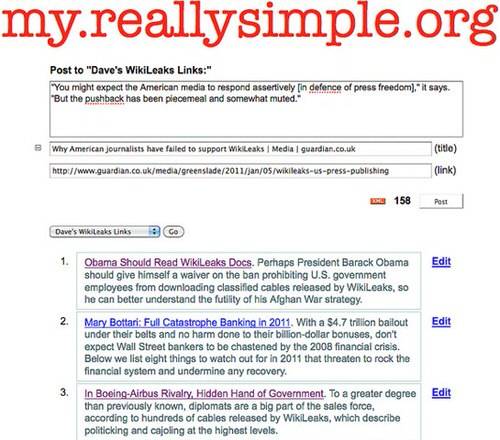Dave Winer, a man who was key to the creation and growth of blogging, RSS, podcasting, OPML and several more technical standards that helped social media become what it is today, announced this morning that he’s working on a new technology, a simple blogging tool that keeps an archival copy of your content on your servers, but pushes it out onto whatever other publishing platform you choose, whether that be Tumblr, Twitter or “whatever new corporate blogging silo is popular next year or the year after.”

“The important thing is that you and your ideas live outside the silo and are ported into it at your pleasure,” Winer wrote in a blog post today. “You never have to worry about getting your stuff out of the silo because it never lived in there in the first place.” This is very good news. It appears that the tool will live first at My.ReallySimple.org (password protected).
The technical implementation of this vision appears relatively straightforward, thanks to Winer’s frustration with the Blogger.com API 10 years ago, creation of the MetaWeblog API in 2002 and subsequent spread of that technology for porting content from site to site, now widely adopted.
Below: Screenshot of a ReallySimple prototype.

Throughout the past decade of massive media disruption, the only people who have played a bigger role in democratizing publishing technology than Winer may be Mark Zuckerberg and Evan Williams. Winer’s work, though, has been technical enough, embedded enough in larger technical communities, so focused on the distributed Web instead of on building up one corporate brand, and so wide-ranging that he’s gained far less public recognition than other major players. His near-absolute disinterest in visual design, his chronically caustic personality and his apparently principle-driven burning of bridges haven’t helped either. (Disclosure: I used to co-host a podcast with Winer and am forever indebted to him for the technologies he’s fostered that have dramatically changed my life and career, but believe that I can make the critical statements above based on far more than how he and I have interacted. Our personal interactions have been just one part of my assessment of the man as a challenging genius.)
None the less, Winer has stepped into the breach of profit-driven companies failing to serve the interests of users time and time again to create platforms that have touched an incalculable number of lives.
Can he do it again? User-facing technologies have never been Winer’s strength; he’s been much more successful revolutionizing the world of content delivery on the back-end. Can he make distributed publishing, by publishers acting as independent entities instead of sharecroppers for platforms enriching their shareholders, a part of peoples’ everyday experiences the same way he helped bring us feed reading and listening to podcasts?
Unless we’ve all been Farmville-zombified too deeply to care anymore, My.ReallySimple is something we all ought to be cheering for.
There’s more to come, too. “This is a piece,” Winer writes, “of the loosely-coupled system I envision booting up over the next months and years.”

















